Business Law and Company Dissolution
VerifiedAdded on 2020/10/23
|17
|5462
|213
AI Summary
This assignment explores various aspects of business law, including company formation and dissolution. JPM is advised to register their business as a company to gain legal recognition and rights. Meanwhile, Amber Ltd is recommended to take an injunction order from the court to protect its confidential data and information. Additionally, alternative solutions such as arbitration are suggested for resolving disputes without litigation.
Contribute Materials
Your contribution can guide someone’s learning journey. Share your
documents today.
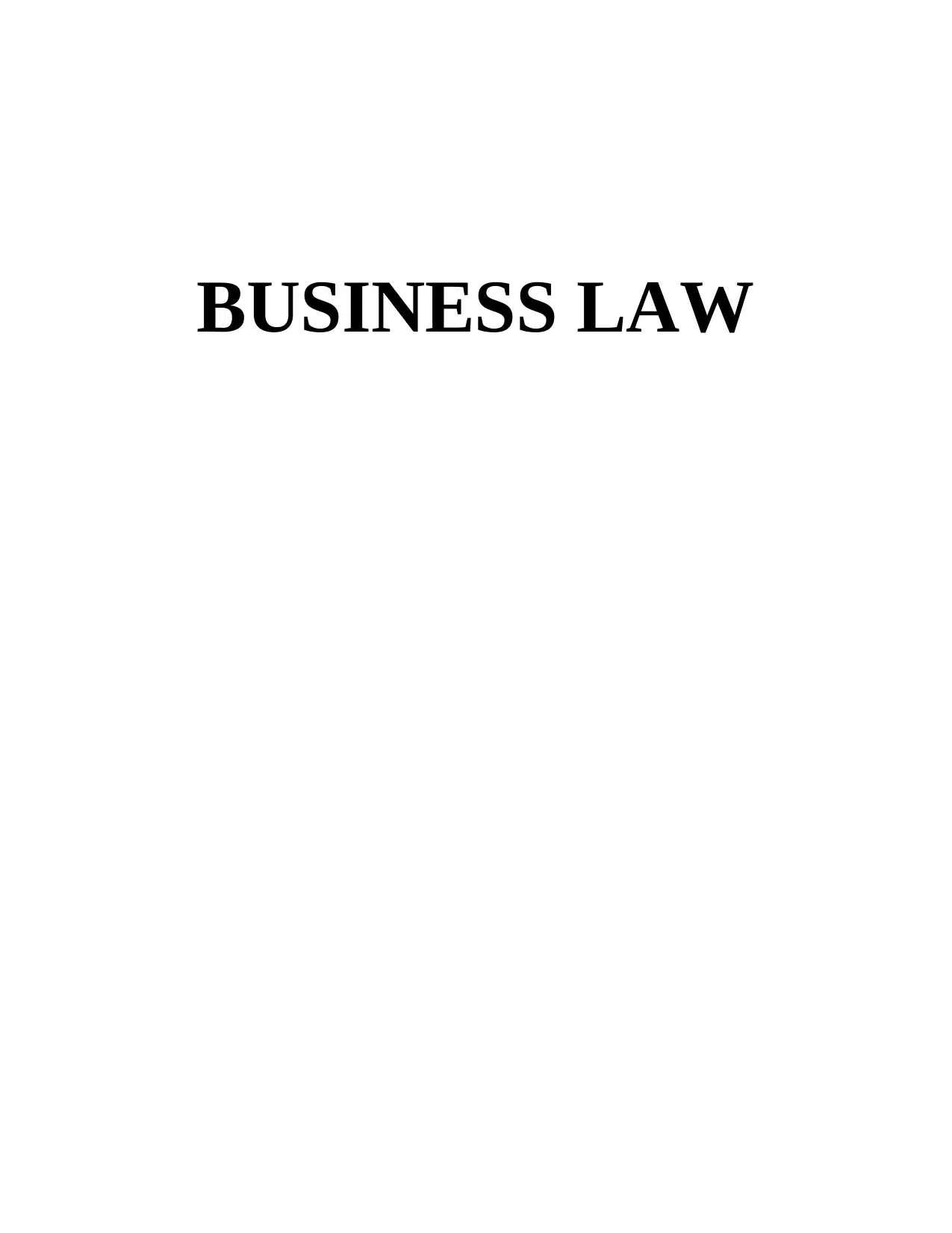
BUSINESS LAW
Secure Best Marks with AI Grader
Need help grading? Try our AI Grader for instant feedback on your assignments.
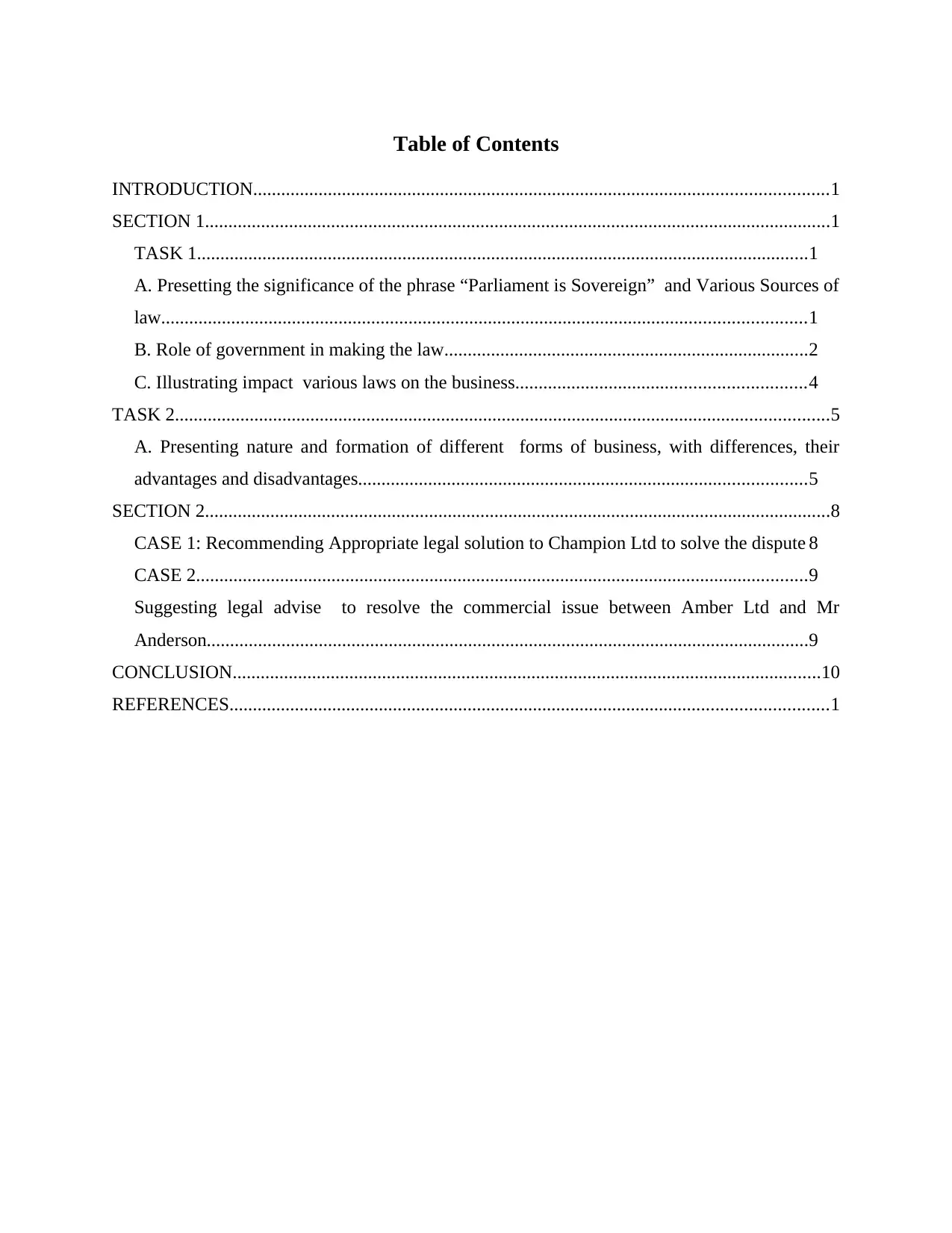
Table of Contents
INTRODUCTION...........................................................................................................................1
SECTION 1......................................................................................................................................1
TASK 1...................................................................................................................................1
A. Presetting the significance of the phrase “Parliament is Sovereign” and Various Sources of
law..........................................................................................................................................1
B. Role of government in making the law..............................................................................2
C. Illustrating impact various laws on the business..............................................................4
TASK 2............................................................................................................................................5
A. Presenting nature and formation of different forms of business, with differences, their
advantages and disadvantages................................................................................................5
SECTION 2......................................................................................................................................8
CASE 1: Recommending Appropriate legal solution to Champion Ltd to solve the dispute 8
CASE 2...................................................................................................................................9
Suggesting legal advise to resolve the commercial issue between Amber Ltd and Mr
Anderson.................................................................................................................................9
CONCLUSION..............................................................................................................................10
REFERENCES................................................................................................................................1
INTRODUCTION...........................................................................................................................1
SECTION 1......................................................................................................................................1
TASK 1...................................................................................................................................1
A. Presetting the significance of the phrase “Parliament is Sovereign” and Various Sources of
law..........................................................................................................................................1
B. Role of government in making the law..............................................................................2
C. Illustrating impact various laws on the business..............................................................4
TASK 2............................................................................................................................................5
A. Presenting nature and formation of different forms of business, with differences, their
advantages and disadvantages................................................................................................5
SECTION 2......................................................................................................................................8
CASE 1: Recommending Appropriate legal solution to Champion Ltd to solve the dispute 8
CASE 2...................................................................................................................................9
Suggesting legal advise to resolve the commercial issue between Amber Ltd and Mr
Anderson.................................................................................................................................9
CONCLUSION..............................................................................................................................10
REFERENCES................................................................................................................................1
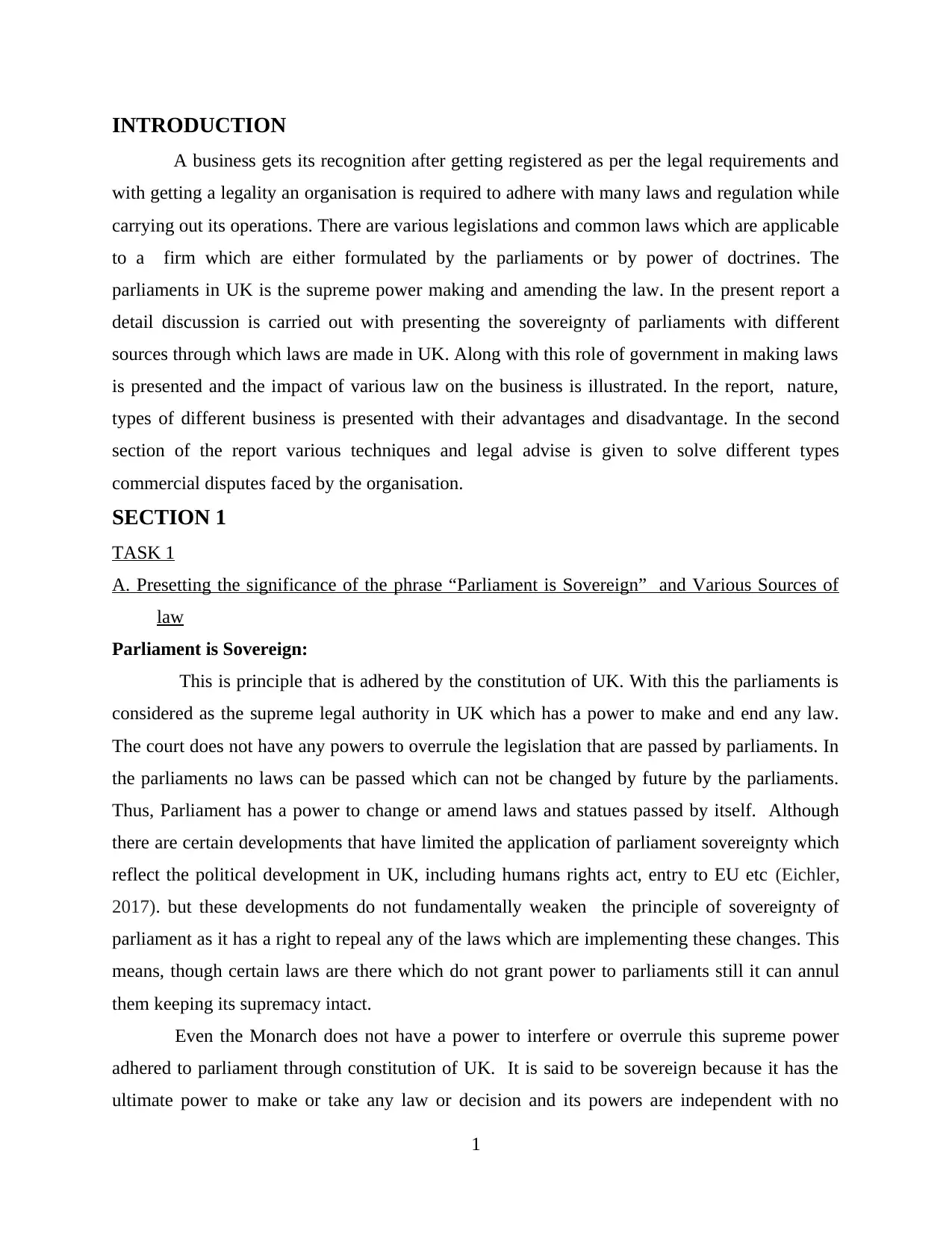
INTRODUCTION
A business gets its recognition after getting registered as per the legal requirements and
with getting a legality an organisation is required to adhere with many laws and regulation while
carrying out its operations. There are various legislations and common laws which are applicable
to a firm which are either formulated by the parliaments or by power of doctrines. The
parliaments in UK is the supreme power making and amending the law. In the present report a
detail discussion is carried out with presenting the sovereignty of parliaments with different
sources through which laws are made in UK. Along with this role of government in making laws
is presented and the impact of various law on the business is illustrated. In the report, nature,
types of different business is presented with their advantages and disadvantage. In the second
section of the report various techniques and legal advise is given to solve different types
commercial disputes faced by the organisation.
SECTION 1
TASK 1
A. Presetting the significance of the phrase “Parliament is Sovereign” and Various Sources of
law
Parliament is Sovereign:
This is principle that is adhered by the constitution of UK. With this the parliaments is
considered as the supreme legal authority in UK which has a power to make and end any law.
The court does not have any powers to overrule the legislation that are passed by parliaments. In
the parliaments no laws can be passed which can not be changed by future by the parliaments.
Thus, Parliament has a power to change or amend laws and statues passed by itself. Although
there are certain developments that have limited the application of parliament sovereignty which
reflect the political development in UK, including humans rights act, entry to EU etc (Eichler,
2017). but these developments do not fundamentally weaken the principle of sovereignty of
parliament as it has a right to repeal any of the laws which are implementing these changes. This
means, though certain laws are there which do not grant power to parliaments still it can annul
them keeping its supremacy intact.
Even the Monarch does not have a power to interfere or overrule this supreme power
adhered to parliament through constitution of UK. It is said to be sovereign because it has the
ultimate power to make or take any law or decision and its powers are independent with no
1
A business gets its recognition after getting registered as per the legal requirements and
with getting a legality an organisation is required to adhere with many laws and regulation while
carrying out its operations. There are various legislations and common laws which are applicable
to a firm which are either formulated by the parliaments or by power of doctrines. The
parliaments in UK is the supreme power making and amending the law. In the present report a
detail discussion is carried out with presenting the sovereignty of parliaments with different
sources through which laws are made in UK. Along with this role of government in making laws
is presented and the impact of various law on the business is illustrated. In the report, nature,
types of different business is presented with their advantages and disadvantage. In the second
section of the report various techniques and legal advise is given to solve different types
commercial disputes faced by the organisation.
SECTION 1
TASK 1
A. Presetting the significance of the phrase “Parliament is Sovereign” and Various Sources of
law
Parliament is Sovereign:
This is principle that is adhered by the constitution of UK. With this the parliaments is
considered as the supreme legal authority in UK which has a power to make and end any law.
The court does not have any powers to overrule the legislation that are passed by parliaments. In
the parliaments no laws can be passed which can not be changed by future by the parliaments.
Thus, Parliament has a power to change or amend laws and statues passed by itself. Although
there are certain developments that have limited the application of parliament sovereignty which
reflect the political development in UK, including humans rights act, entry to EU etc (Eichler,
2017). but these developments do not fundamentally weaken the principle of sovereignty of
parliament as it has a right to repeal any of the laws which are implementing these changes. This
means, though certain laws are there which do not grant power to parliaments still it can annul
them keeping its supremacy intact.
Even the Monarch does not have a power to interfere or overrule this supreme power
adhered to parliament through constitution of UK. It is said to be sovereign because it has the
ultimate power to make or take any law or decision and its powers are independent with no
1
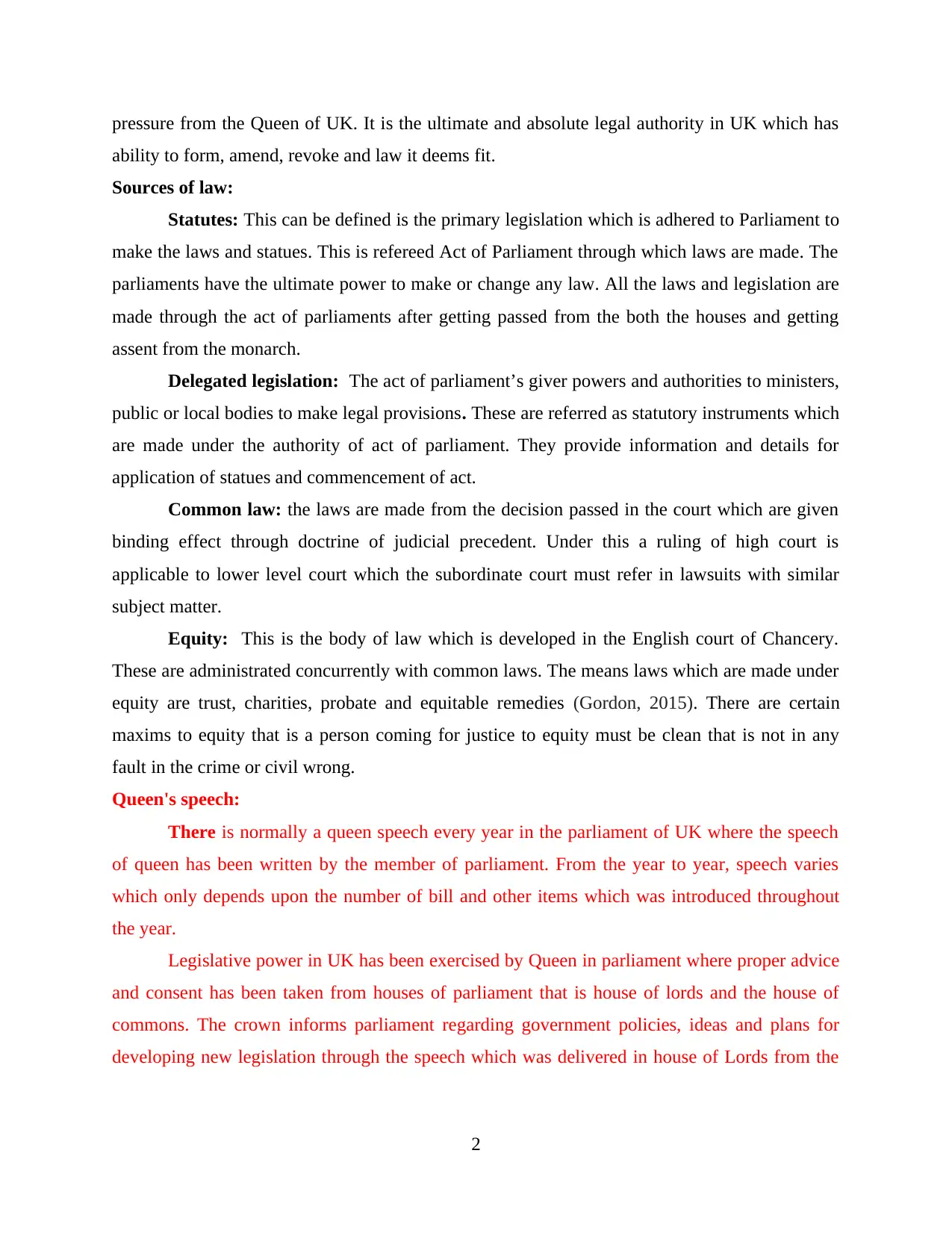
pressure from the Queen of UK. It is the ultimate and absolute legal authority in UK which has
ability to form, amend, revoke and law it deems fit.
Sources of law:
Statutes: This can be defined is the primary legislation which is adhered to Parliament to
make the laws and statues. This is refereed Act of Parliament through which laws are made. The
parliaments have the ultimate power to make or change any law. All the laws and legislation are
made through the act of parliaments after getting passed from the both the houses and getting
assent from the monarch.
Delegated legislation: The act of parliament’s giver powers and authorities to ministers,
public or local bodies to make legal provisions. These are referred as statutory instruments which
are made under the authority of act of parliament. They provide information and details for
application of statues and commencement of act.
Common law: the laws are made from the decision passed in the court which are given
binding effect through doctrine of judicial precedent. Under this a ruling of high court is
applicable to lower level court which the subordinate court must refer in lawsuits with similar
subject matter.
Equity: This is the body of law which is developed in the English court of Chancery.
These are administrated concurrently with common laws. The means laws which are made under
equity are trust, charities, probate and equitable remedies (Gordon, 2015). There are certain
maxims to equity that is a person coming for justice to equity must be clean that is not in any
fault in the crime or civil wrong.
Queen's speech:
There is normally a queen speech every year in the parliament of UK where the speech
of queen has been written by the member of parliament. From the year to year, speech varies
which only depends upon the number of bill and other items which was introduced throughout
the year.
Legislative power in UK has been exercised by Queen in parliament where proper advice
and consent has been taken from houses of parliament that is house of lords and the house of
commons. The crown informs parliament regarding government policies, ideas and plans for
developing new legislation through the speech which was delivered in house of Lords from the
2
ability to form, amend, revoke and law it deems fit.
Sources of law:
Statutes: This can be defined is the primary legislation which is adhered to Parliament to
make the laws and statues. This is refereed Act of Parliament through which laws are made. The
parliaments have the ultimate power to make or change any law. All the laws and legislation are
made through the act of parliaments after getting passed from the both the houses and getting
assent from the monarch.
Delegated legislation: The act of parliament’s giver powers and authorities to ministers,
public or local bodies to make legal provisions. These are referred as statutory instruments which
are made under the authority of act of parliament. They provide information and details for
application of statues and commencement of act.
Common law: the laws are made from the decision passed in the court which are given
binding effect through doctrine of judicial precedent. Under this a ruling of high court is
applicable to lower level court which the subordinate court must refer in lawsuits with similar
subject matter.
Equity: This is the body of law which is developed in the English court of Chancery.
These are administrated concurrently with common laws. The means laws which are made under
equity are trust, charities, probate and equitable remedies (Gordon, 2015). There are certain
maxims to equity that is a person coming for justice to equity must be clean that is not in any
fault in the crime or civil wrong.
Queen's speech:
There is normally a queen speech every year in the parliament of UK where the speech
of queen has been written by the member of parliament. From the year to year, speech varies
which only depends upon the number of bill and other items which was introduced throughout
the year.
Legislative power in UK has been exercised by Queen in parliament where proper advice
and consent has been taken from houses of parliament that is house of lords and the house of
commons. The crown informs parliament regarding government policies, ideas and plans for
developing new legislation through the speech which was delivered in house of Lords from the
2
Secure Best Marks with AI Grader
Need help grading? Try our AI Grader for instant feedback on your assignments.
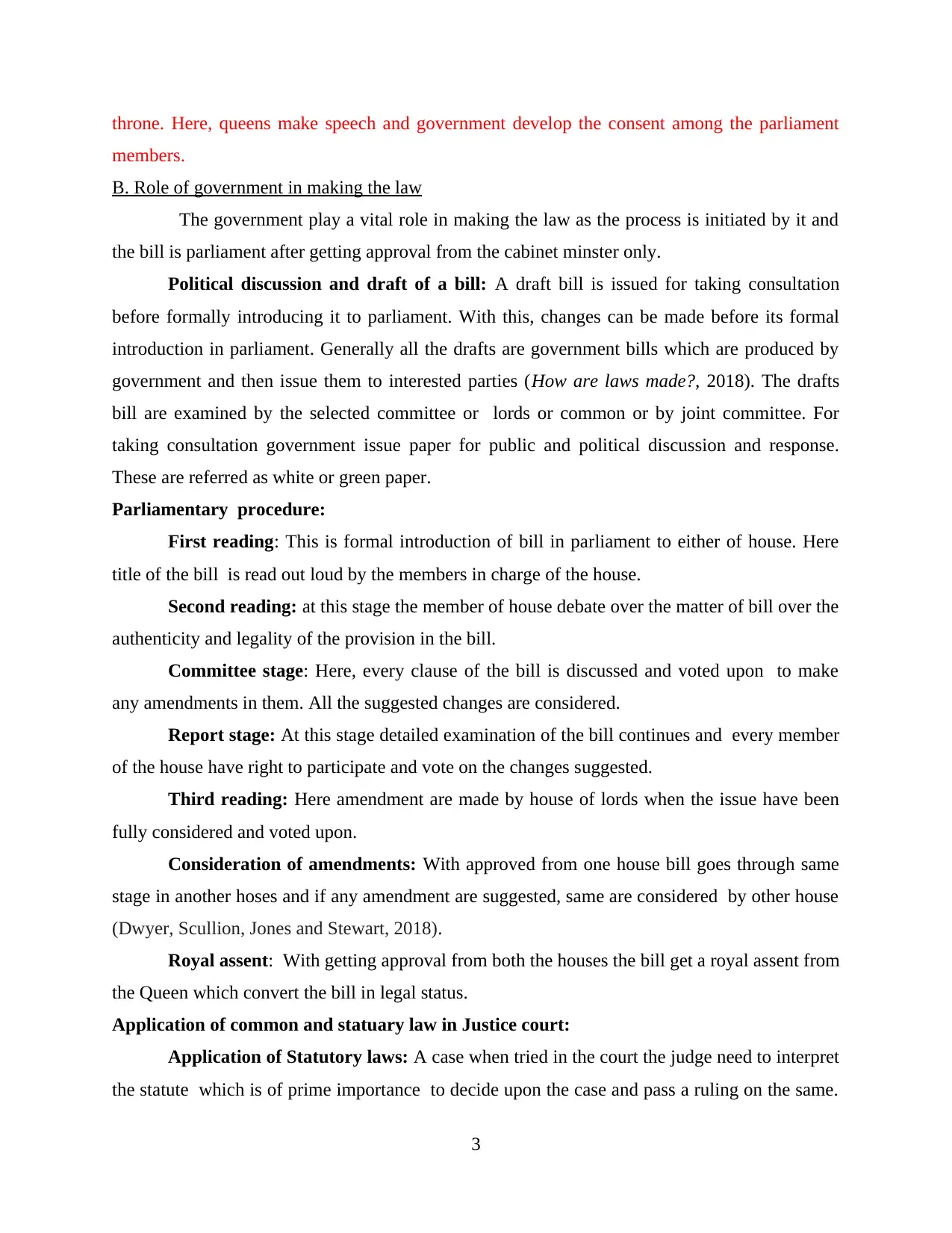
throne. Here, queens make speech and government develop the consent among the parliament
members.
B. Role of government in making the law
The government play a vital role in making the law as the process is initiated by it and
the bill is parliament after getting approval from the cabinet minster only.
Political discussion and draft of a bill: A draft bill is issued for taking consultation
before formally introducing it to parliament. With this, changes can be made before its formal
introduction in parliament. Generally all the drafts are government bills which are produced by
government and then issue them to interested parties (How are laws made?, 2018). The drafts
bill are examined by the selected committee or lords or common or by joint committee. For
taking consultation government issue paper for public and political discussion and response.
These are referred as white or green paper.
Parliamentary procedure:
First reading: This is formal introduction of bill in parliament to either of house. Here
title of the bill is read out loud by the members in charge of the house.
Second reading: at this stage the member of house debate over the matter of bill over the
authenticity and legality of the provision in the bill.
Committee stage: Here, every clause of the bill is discussed and voted upon to make
any amendments in them. All the suggested changes are considered.
Report stage: At this stage detailed examination of the bill continues and every member
of the house have right to participate and vote on the changes suggested.
Third reading: Here amendment are made by house of lords when the issue have been
fully considered and voted upon.
Consideration of amendments: With approved from one house bill goes through same
stage in another hoses and if any amendment are suggested, same are considered by other house
(Dwyer, Scullion, Jones and Stewart, 2018).
Royal assent: With getting approval from both the houses the bill get a royal assent from
the Queen which convert the bill in legal status.
Application of common and statuary law in Justice court:
Application of Statutory laws: A case when tried in the court the judge need to interpret
the statute which is of prime importance to decide upon the case and pass a ruling on the same.
3
members.
B. Role of government in making the law
The government play a vital role in making the law as the process is initiated by it and
the bill is parliament after getting approval from the cabinet minster only.
Political discussion and draft of a bill: A draft bill is issued for taking consultation
before formally introducing it to parliament. With this, changes can be made before its formal
introduction in parliament. Generally all the drafts are government bills which are produced by
government and then issue them to interested parties (How are laws made?, 2018). The drafts
bill are examined by the selected committee or lords or common or by joint committee. For
taking consultation government issue paper for public and political discussion and response.
These are referred as white or green paper.
Parliamentary procedure:
First reading: This is formal introduction of bill in parliament to either of house. Here
title of the bill is read out loud by the members in charge of the house.
Second reading: at this stage the member of house debate over the matter of bill over the
authenticity and legality of the provision in the bill.
Committee stage: Here, every clause of the bill is discussed and voted upon to make
any amendments in them. All the suggested changes are considered.
Report stage: At this stage detailed examination of the bill continues and every member
of the house have right to participate and vote on the changes suggested.
Third reading: Here amendment are made by house of lords when the issue have been
fully considered and voted upon.
Consideration of amendments: With approved from one house bill goes through same
stage in another hoses and if any amendment are suggested, same are considered by other house
(Dwyer, Scullion, Jones and Stewart, 2018).
Royal assent: With getting approval from both the houses the bill get a royal assent from
the Queen which convert the bill in legal status.
Application of common and statuary law in Justice court:
Application of Statutory laws: A case when tried in the court the judge need to interpret
the statute which is of prime importance to decide upon the case and pass a ruling on the same.
3
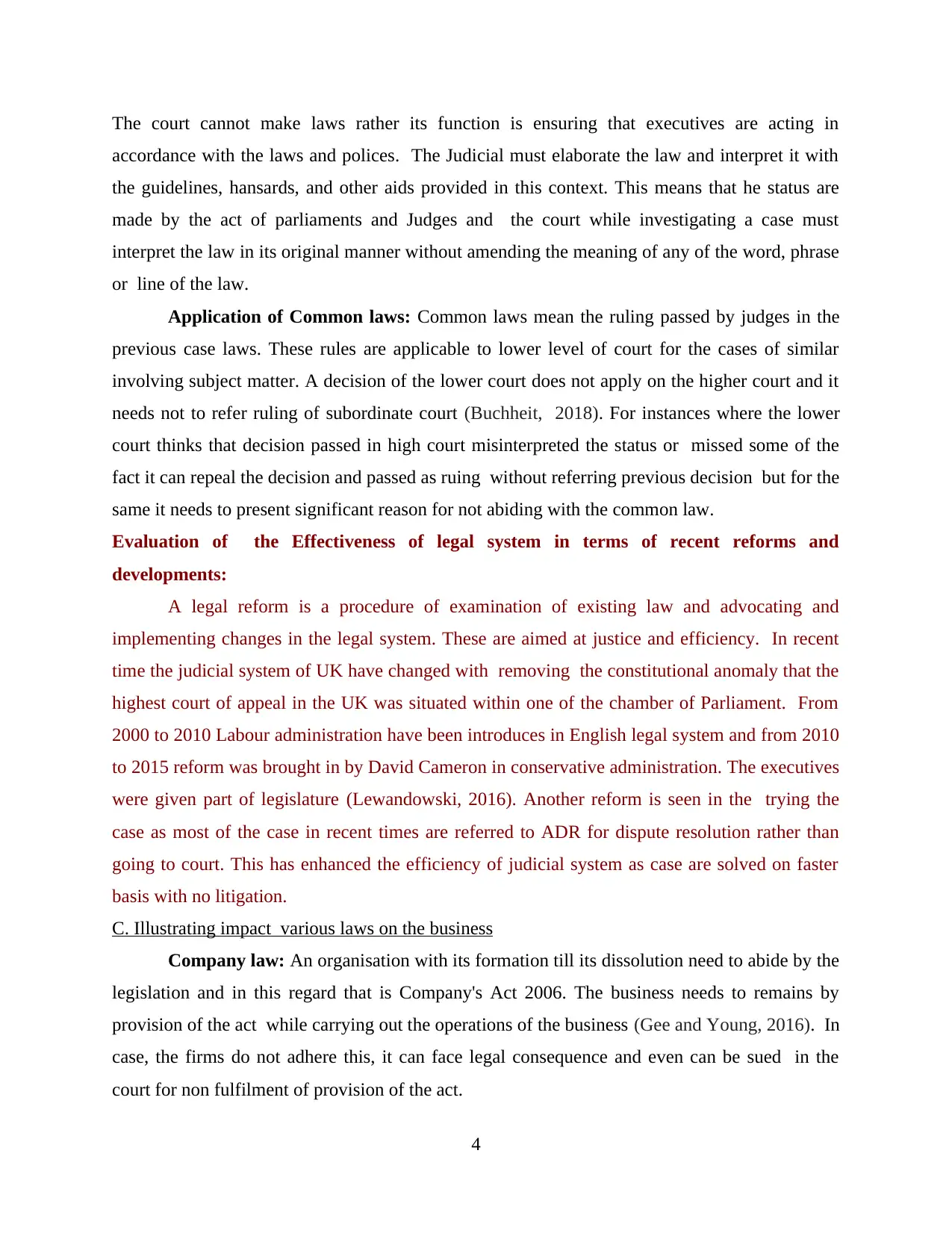
The court cannot make laws rather its function is ensuring that executives are acting in
accordance with the laws and polices. The Judicial must elaborate the law and interpret it with
the guidelines, hansards, and other aids provided in this context. This means that he status are
made by the act of parliaments and Judges and the court while investigating a case must
interpret the law in its original manner without amending the meaning of any of the word, phrase
or line of the law.
Application of Common laws: Common laws mean the ruling passed by judges in the
previous case laws. These rules are applicable to lower level of court for the cases of similar
involving subject matter. A decision of the lower court does not apply on the higher court and it
needs not to refer ruling of subordinate court (Buchheit, 2018). For instances where the lower
court thinks that decision passed in high court misinterpreted the status or missed some of the
fact it can repeal the decision and passed as ruing without referring previous decision but for the
same it needs to present significant reason for not abiding with the common law.
Evaluation of the Effectiveness of legal system in terms of recent reforms and
developments:
A legal reform is a procedure of examination of existing law and advocating and
implementing changes in the legal system. These are aimed at justice and efficiency. In recent
time the judicial system of UK have changed with removing the constitutional anomaly that the
highest court of appeal in the UK was situated within one of the chamber of Parliament. From
2000 to 2010 Labour administration have been introduces in English legal system and from 2010
to 2015 reform was brought in by David Cameron in conservative administration. The executives
were given part of legislature (Lewandowski, 2016). Another reform is seen in the trying the
case as most of the case in recent times are referred to ADR for dispute resolution rather than
going to court. This has enhanced the efficiency of judicial system as case are solved on faster
basis with no litigation.
C. Illustrating impact various laws on the business
Company law: An organisation with its formation till its dissolution need to abide by the
legislation and in this regard that is Company's Act 2006. The business needs to remains by
provision of the act while carrying out the operations of the business (Gee and Young, 2016). In
case, the firms do not adhere this, it can face legal consequence and even can be sued in the
court for non fulfilment of provision of the act.
4
accordance with the laws and polices. The Judicial must elaborate the law and interpret it with
the guidelines, hansards, and other aids provided in this context. This means that he status are
made by the act of parliaments and Judges and the court while investigating a case must
interpret the law in its original manner without amending the meaning of any of the word, phrase
or line of the law.
Application of Common laws: Common laws mean the ruling passed by judges in the
previous case laws. These rules are applicable to lower level of court for the cases of similar
involving subject matter. A decision of the lower court does not apply on the higher court and it
needs not to refer ruling of subordinate court (Buchheit, 2018). For instances where the lower
court thinks that decision passed in high court misinterpreted the status or missed some of the
fact it can repeal the decision and passed as ruing without referring previous decision but for the
same it needs to present significant reason for not abiding with the common law.
Evaluation of the Effectiveness of legal system in terms of recent reforms and
developments:
A legal reform is a procedure of examination of existing law and advocating and
implementing changes in the legal system. These are aimed at justice and efficiency. In recent
time the judicial system of UK have changed with removing the constitutional anomaly that the
highest court of appeal in the UK was situated within one of the chamber of Parliament. From
2000 to 2010 Labour administration have been introduces in English legal system and from 2010
to 2015 reform was brought in by David Cameron in conservative administration. The executives
were given part of legislature (Lewandowski, 2016). Another reform is seen in the trying the
case as most of the case in recent times are referred to ADR for dispute resolution rather than
going to court. This has enhanced the efficiency of judicial system as case are solved on faster
basis with no litigation.
C. Illustrating impact various laws on the business
Company law: An organisation with its formation till its dissolution need to abide by the
legislation and in this regard that is Company's Act 2006. The business needs to remains by
provision of the act while carrying out the operations of the business (Gee and Young, 2016). In
case, the firms do not adhere this, it can face legal consequence and even can be sued in the
court for non fulfilment of provision of the act.
4
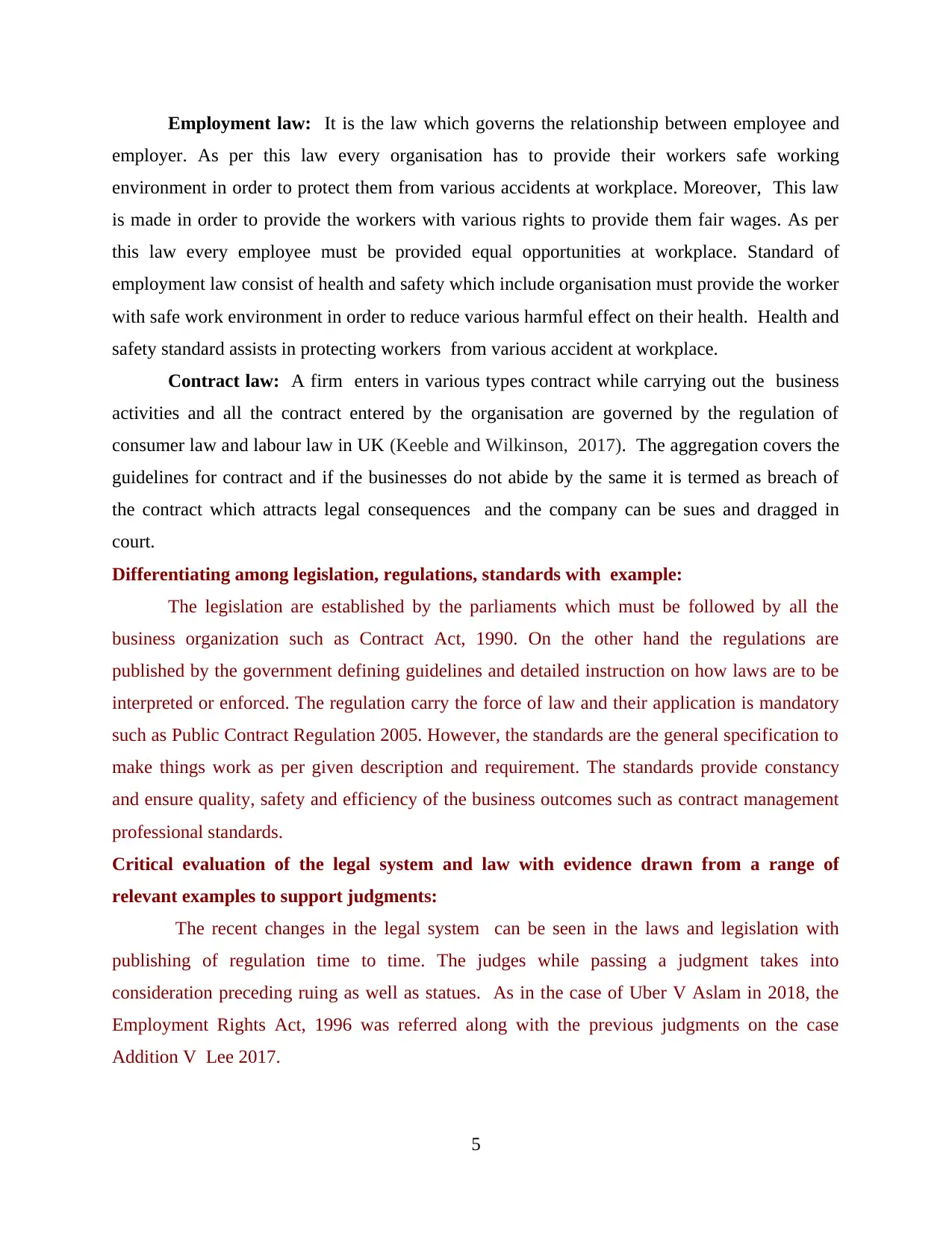
Employment law: It is the law which governs the relationship between employee and
employer. As per this law every organisation has to provide their workers safe working
environment in order to protect them from various accidents at workplace. Moreover, This law
is made in order to provide the workers with various rights to provide them fair wages. As per
this law every employee must be provided equal opportunities at workplace. Standard of
employment law consist of health and safety which include organisation must provide the worker
with safe work environment in order to reduce various harmful effect on their health. Health and
safety standard assists in protecting workers from various accident at workplace.
Contract law: A firm enters in various types contract while carrying out the business
activities and all the contract entered by the organisation are governed by the regulation of
consumer law and labour law in UK (Keeble and Wilkinson, 2017). The aggregation covers the
guidelines for contract and if the businesses do not abide by the same it is termed as breach of
the contract which attracts legal consequences and the company can be sues and dragged in
court.
Differentiating among legislation, regulations, standards with example:
The legislation are established by the parliaments which must be followed by all the
business organization such as Contract Act, 1990. On the other hand the regulations are
published by the government defining guidelines and detailed instruction on how laws are to be
interpreted or enforced. The regulation carry the force of law and their application is mandatory
such as Public Contract Regulation 2005. However, the standards are the general specification to
make things work as per given description and requirement. The standards provide constancy
and ensure quality, safety and efficiency of the business outcomes such as contract management
professional standards.
Critical evaluation of the legal system and law with evidence drawn from a range of
relevant examples to support judgments:
The recent changes in the legal system can be seen in the laws and legislation with
publishing of regulation time to time. The judges while passing a judgment takes into
consideration preceding ruing as well as statues. As in the case of Uber V Aslam in 2018, the
Employment Rights Act, 1996 was referred along with the previous judgments on the case
Addition V Lee 2017.
5
employer. As per this law every organisation has to provide their workers safe working
environment in order to protect them from various accidents at workplace. Moreover, This law
is made in order to provide the workers with various rights to provide them fair wages. As per
this law every employee must be provided equal opportunities at workplace. Standard of
employment law consist of health and safety which include organisation must provide the worker
with safe work environment in order to reduce various harmful effect on their health. Health and
safety standard assists in protecting workers from various accident at workplace.
Contract law: A firm enters in various types contract while carrying out the business
activities and all the contract entered by the organisation are governed by the regulation of
consumer law and labour law in UK (Keeble and Wilkinson, 2017). The aggregation covers the
guidelines for contract and if the businesses do not abide by the same it is termed as breach of
the contract which attracts legal consequences and the company can be sues and dragged in
court.
Differentiating among legislation, regulations, standards with example:
The legislation are established by the parliaments which must be followed by all the
business organization such as Contract Act, 1990. On the other hand the regulations are
published by the government defining guidelines and detailed instruction on how laws are to be
interpreted or enforced. The regulation carry the force of law and their application is mandatory
such as Public Contract Regulation 2005. However, the standards are the general specification to
make things work as per given description and requirement. The standards provide constancy
and ensure quality, safety and efficiency of the business outcomes such as contract management
professional standards.
Critical evaluation of the legal system and law with evidence drawn from a range of
relevant examples to support judgments:
The recent changes in the legal system can be seen in the laws and legislation with
publishing of regulation time to time. The judges while passing a judgment takes into
consideration preceding ruing as well as statues. As in the case of Uber V Aslam in 2018, the
Employment Rights Act, 1996 was referred along with the previous judgments on the case
Addition V Lee 2017.
5
Paraphrase This Document
Need a fresh take? Get an instant paraphrase of this document with our AI Paraphraser
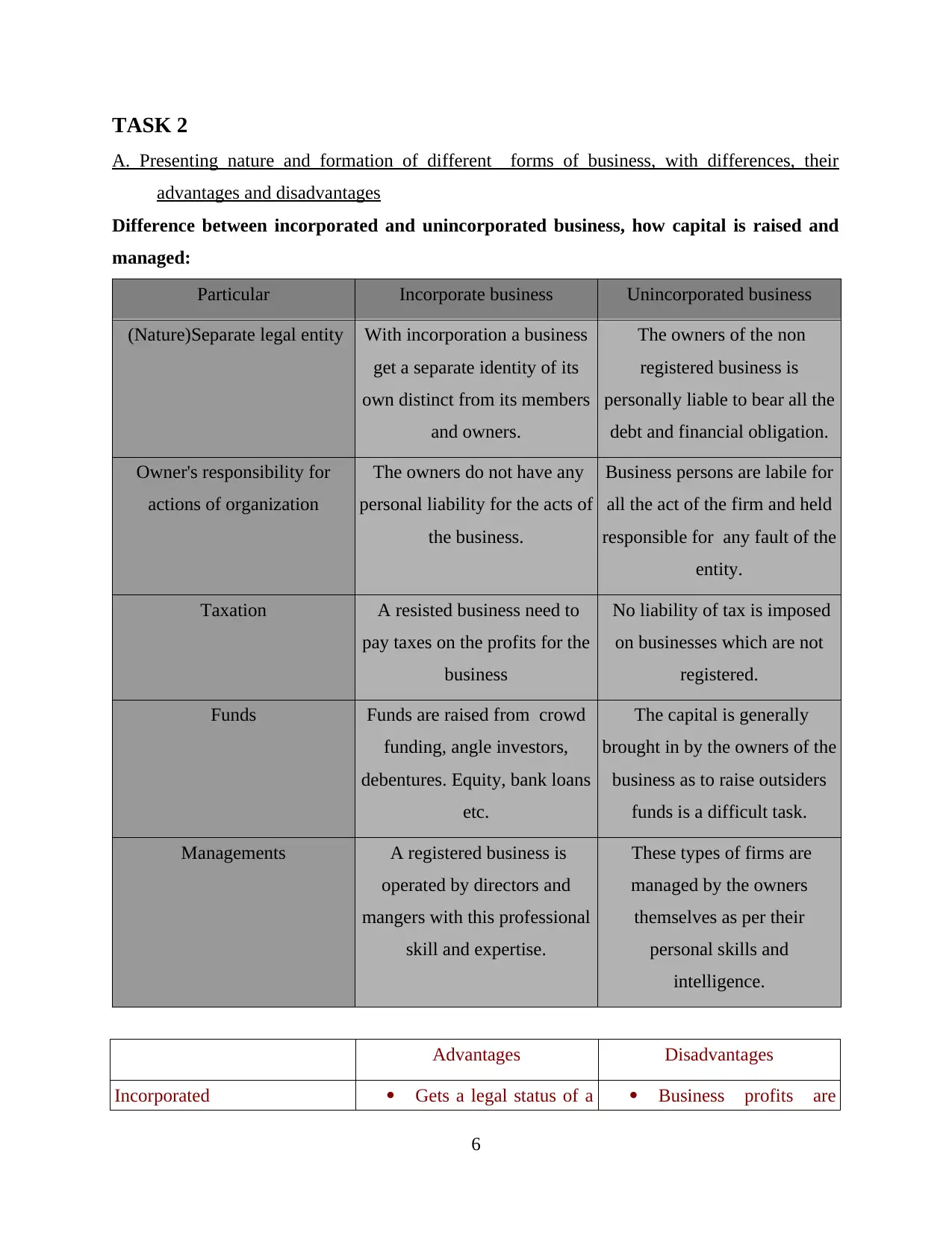
TASK 2
A. Presenting nature and formation of different forms of business, with differences, their
advantages and disadvantages
Difference between incorporated and unincorporated business, how capital is raised and
managed:
Particular Incorporate business Unincorporated business
(Nature)Separate legal entity With incorporation a business
get a separate identity of its
own distinct from its members
and owners.
The owners of the non
registered business is
personally liable to bear all the
debt and financial obligation.
Owner's responsibility for
actions of organization
The owners do not have any
personal liability for the acts of
the business.
Business persons are labile for
all the act of the firm and held
responsible for any fault of the
entity.
Taxation A resisted business need to
pay taxes on the profits for the
business
No liability of tax is imposed
on businesses which are not
registered.
Funds Funds are raised from crowd
funding, angle investors,
debentures. Equity, bank loans
etc.
The capital is generally
brought in by the owners of the
business as to raise outsiders
funds is a difficult task.
Managements A registered business is
operated by directors and
mangers with this professional
skill and expertise.
These types of firms are
managed by the owners
themselves as per their
personal skills and
intelligence.
Advantages Disadvantages
Incorporated Gets a legal status of a Business profits are
6
A. Presenting nature and formation of different forms of business, with differences, their
advantages and disadvantages
Difference between incorporated and unincorporated business, how capital is raised and
managed:
Particular Incorporate business Unincorporated business
(Nature)Separate legal entity With incorporation a business
get a separate identity of its
own distinct from its members
and owners.
The owners of the non
registered business is
personally liable to bear all the
debt and financial obligation.
Owner's responsibility for
actions of organization
The owners do not have any
personal liability for the acts of
the business.
Business persons are labile for
all the act of the firm and held
responsible for any fault of the
entity.
Taxation A resisted business need to
pay taxes on the profits for the
business
No liability of tax is imposed
on businesses which are not
registered.
Funds Funds are raised from crowd
funding, angle investors,
debentures. Equity, bank loans
etc.
The capital is generally
brought in by the owners of the
business as to raise outsiders
funds is a difficult task.
Managements A registered business is
operated by directors and
mangers with this professional
skill and expertise.
These types of firms are
managed by the owners
themselves as per their
personal skills and
intelligence.
Advantages Disadvantages
Incorporated Gets a legal status of a Business profits are
6
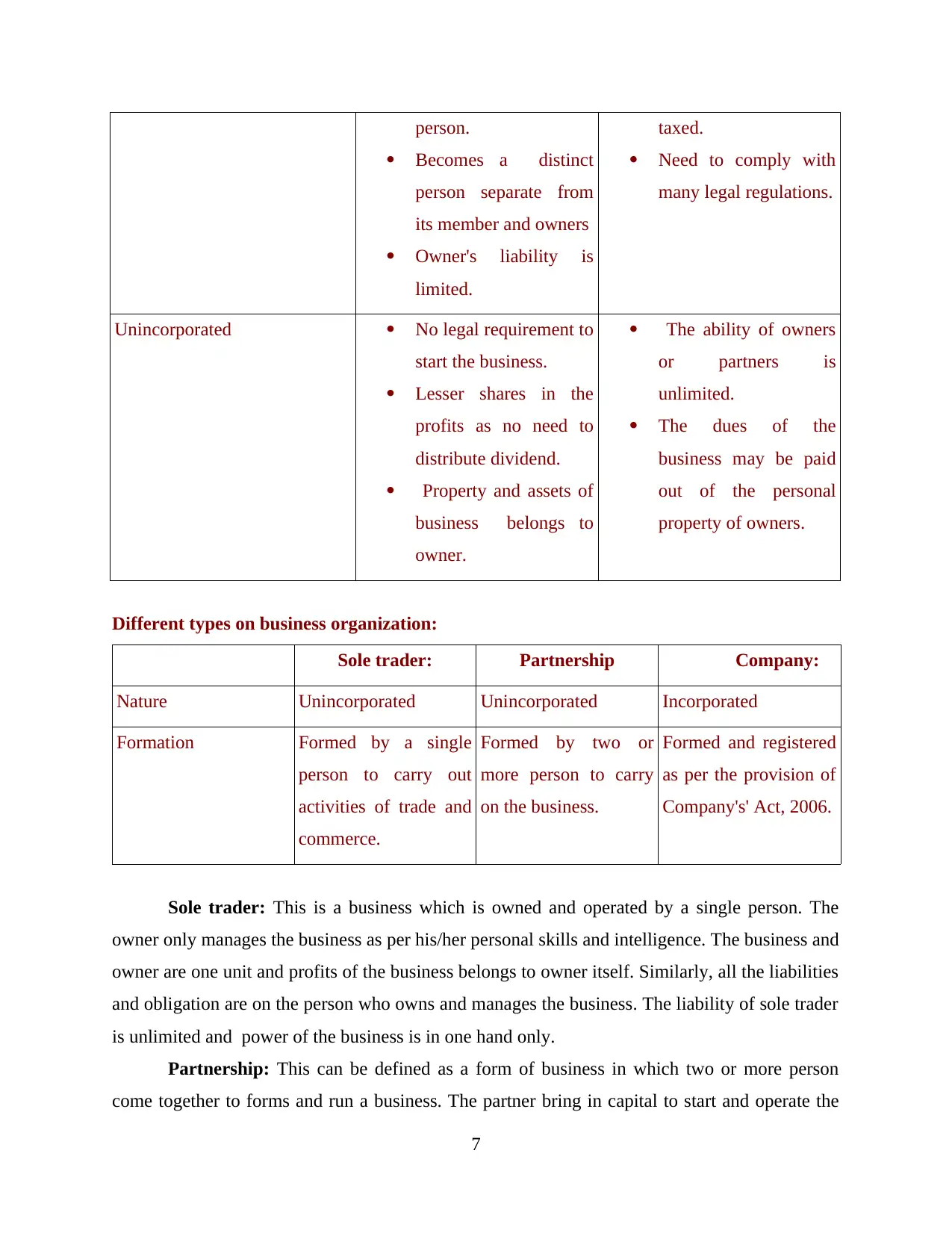
person.
Becomes a distinct
person separate from
its member and owners
Owner's liability is
limited.
taxed.
Need to comply with
many legal regulations.
Unincorporated No legal requirement to
start the business.
Lesser shares in the
profits as no need to
distribute dividend.
Property and assets of
business belongs to
owner.
The ability of owners
or partners is
unlimited.
The dues of the
business may be paid
out of the personal
property of owners.
Different types on business organization:
Sole trader: Partnership Company:
Nature Unincorporated Unincorporated Incorporated
Formation Formed by a single
person to carry out
activities of trade and
commerce.
Formed by two or
more person to carry
on the business.
Formed and registered
as per the provision of
Company's' Act, 2006.
Sole trader: This is a business which is owned and operated by a single person. The
owner only manages the business as per his/her personal skills and intelligence. The business and
owner are one unit and profits of the business belongs to owner itself. Similarly, all the liabilities
and obligation are on the person who owns and manages the business. The liability of sole trader
is unlimited and power of the business is in one hand only.
Partnership: This can be defined as a form of business in which two or more person
come together to forms and run a business. The partner bring in capital to start and operate the
7
Becomes a distinct
person separate from
its member and owners
Owner's liability is
limited.
taxed.
Need to comply with
many legal regulations.
Unincorporated No legal requirement to
start the business.
Lesser shares in the
profits as no need to
distribute dividend.
Property and assets of
business belongs to
owner.
The ability of owners
or partners is
unlimited.
The dues of the
business may be paid
out of the personal
property of owners.
Different types on business organization:
Sole trader: Partnership Company:
Nature Unincorporated Unincorporated Incorporated
Formation Formed by a single
person to carry out
activities of trade and
commerce.
Formed by two or
more person to carry
on the business.
Formed and registered
as per the provision of
Company's' Act, 2006.
Sole trader: This is a business which is owned and operated by a single person. The
owner only manages the business as per his/her personal skills and intelligence. The business and
owner are one unit and profits of the business belongs to owner itself. Similarly, all the liabilities
and obligation are on the person who owns and manages the business. The liability of sole trader
is unlimited and power of the business is in one hand only.
Partnership: This can be defined as a form of business in which two or more person
come together to forms and run a business. The partner bring in capital to start and operate the
7
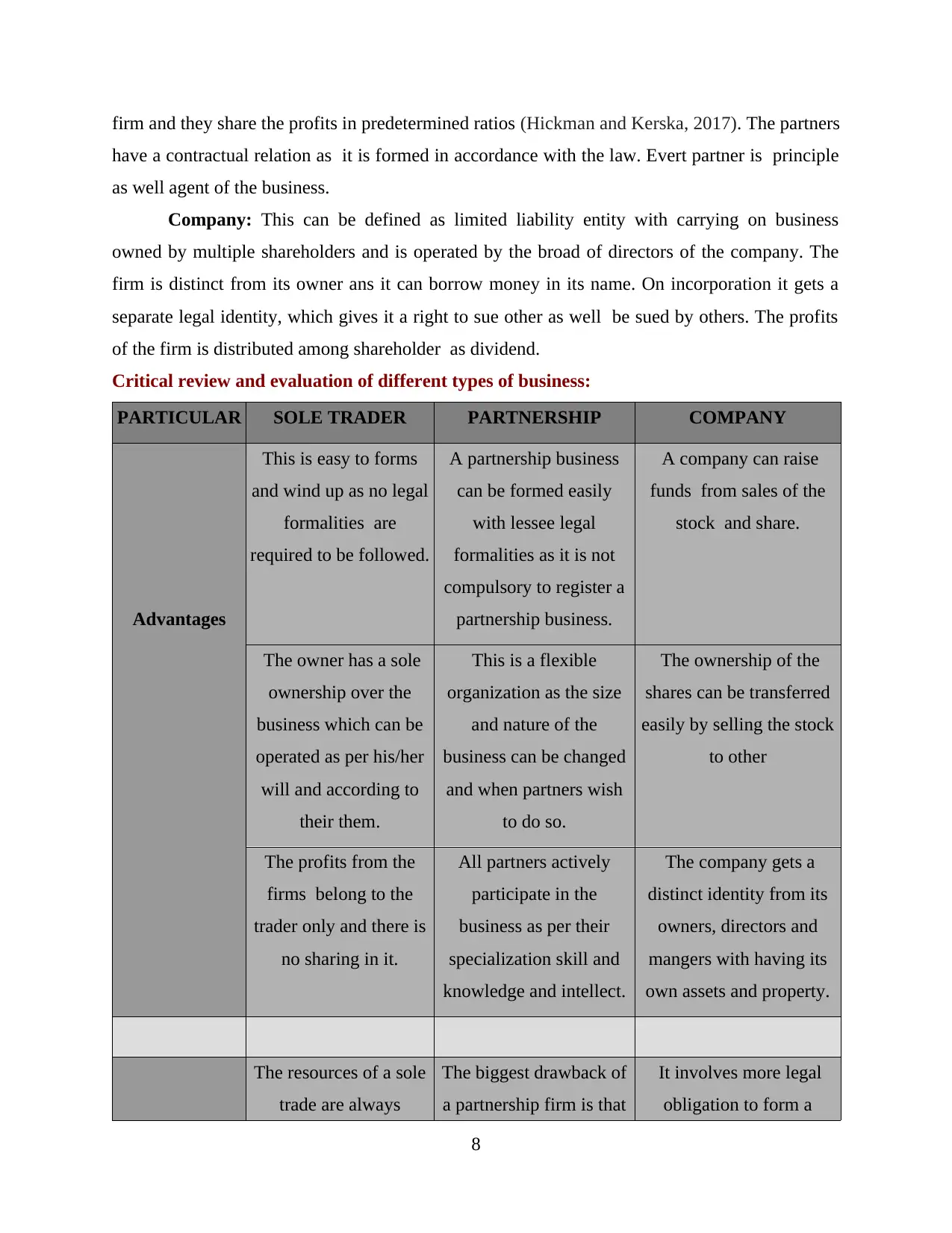
firm and they share the profits in predetermined ratios (Hickman and Kerska, 2017). The partners
have a contractual relation as it is formed in accordance with the law. Evert partner is principle
as well agent of the business.
Company: This can be defined as limited liability entity with carrying on business
owned by multiple shareholders and is operated by the broad of directors of the company. The
firm is distinct from its owner ans it can borrow money in its name. On incorporation it gets a
separate legal identity, which gives it a right to sue other as well be sued by others. The profits
of the firm is distributed among shareholder as dividend.
Critical review and evaluation of different types of business:
PARTICULAR SOLE TRADER PARTNERSHIP COMPANY
Advantages
This is easy to forms
and wind up as no legal
formalities are
required to be followed.
A partnership business
can be formed easily
with lessee legal
formalities as it is not
compulsory to register a
partnership business.
A company can raise
funds from sales of the
stock and share.
The owner has a sole
ownership over the
business which can be
operated as per his/her
will and according to
their them.
This is a flexible
organization as the size
and nature of the
business can be changed
and when partners wish
to do so.
The ownership of the
shares can be transferred
easily by selling the stock
to other
The profits from the
firms belong to the
trader only and there is
no sharing in it.
All partners actively
participate in the
business as per their
specialization skill and
knowledge and intellect.
The company gets a
distinct identity from its
owners, directors and
mangers with having its
own assets and property.
The resources of a sole
trade are always
The biggest drawback of
a partnership firm is that
It involves more legal
obligation to form a
8
have a contractual relation as it is formed in accordance with the law. Evert partner is principle
as well agent of the business.
Company: This can be defined as limited liability entity with carrying on business
owned by multiple shareholders and is operated by the broad of directors of the company. The
firm is distinct from its owner ans it can borrow money in its name. On incorporation it gets a
separate legal identity, which gives it a right to sue other as well be sued by others. The profits
of the firm is distributed among shareholder as dividend.
Critical review and evaluation of different types of business:
PARTICULAR SOLE TRADER PARTNERSHIP COMPANY
Advantages
This is easy to forms
and wind up as no legal
formalities are
required to be followed.
A partnership business
can be formed easily
with lessee legal
formalities as it is not
compulsory to register a
partnership business.
A company can raise
funds from sales of the
stock and share.
The owner has a sole
ownership over the
business which can be
operated as per his/her
will and according to
their them.
This is a flexible
organization as the size
and nature of the
business can be changed
and when partners wish
to do so.
The ownership of the
shares can be transferred
easily by selling the stock
to other
The profits from the
firms belong to the
trader only and there is
no sharing in it.
All partners actively
participate in the
business as per their
specialization skill and
knowledge and intellect.
The company gets a
distinct identity from its
owners, directors and
mangers with having its
own assets and property.
The resources of a sole
trade are always
The biggest drawback of
a partnership firm is that
It involves more legal
obligation to form a
8
Secure Best Marks with AI Grader
Need help grading? Try our AI Grader for instant feedback on your assignments.
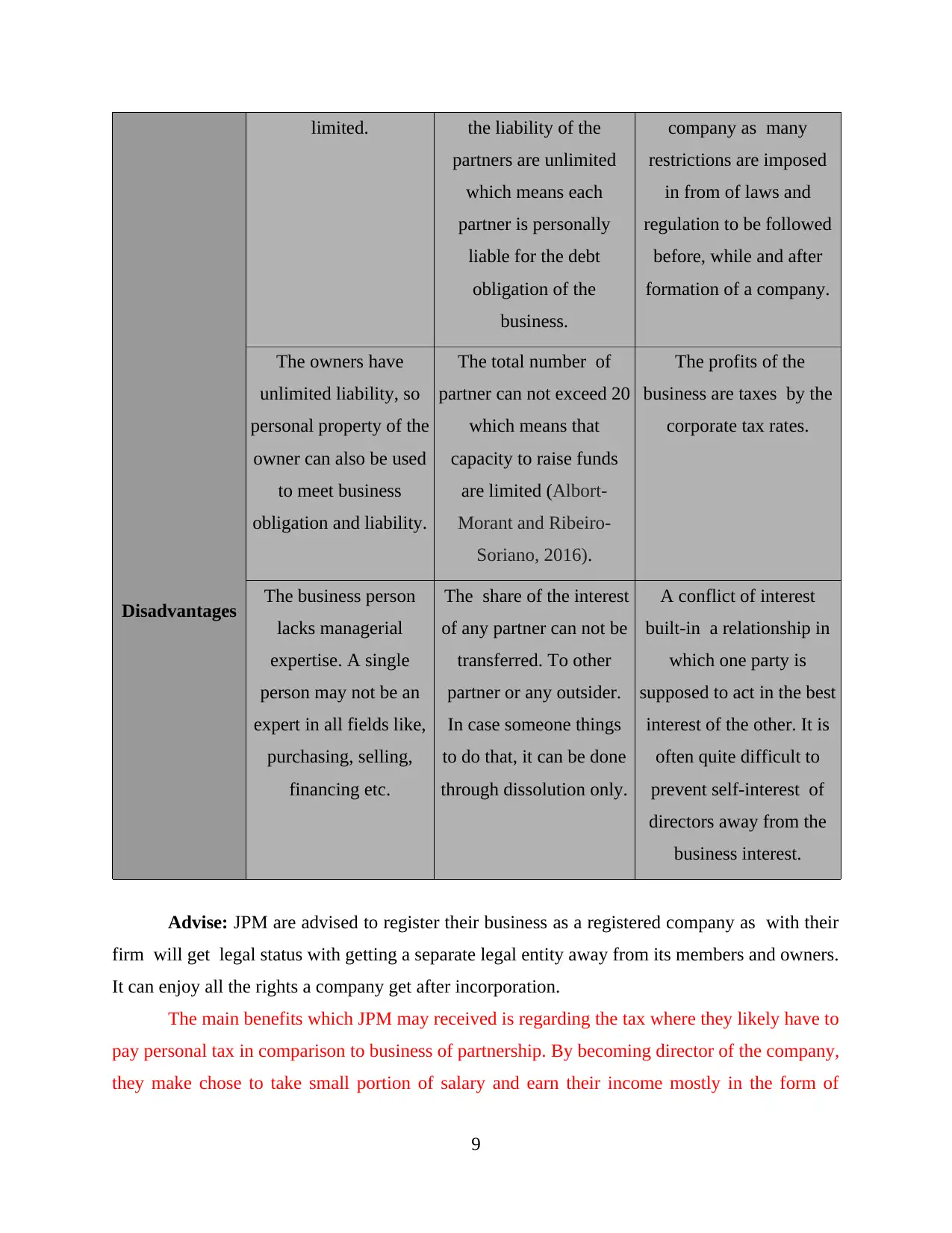
Disadvantages
limited. the liability of the
partners are unlimited
which means each
partner is personally
liable for the debt
obligation of the
business.
company as many
restrictions are imposed
in from of laws and
regulation to be followed
before, while and after
formation of a company.
The owners have
unlimited liability, so
personal property of the
owner can also be used
to meet business
obligation and liability.
The total number of
partner can not exceed 20
which means that
capacity to raise funds
are limited (Albort-
Morant and Ribeiro-
Soriano, 2016).
The profits of the
business are taxes by the
corporate tax rates.
The business person
lacks managerial
expertise. A single
person may not be an
expert in all fields like,
purchasing, selling,
financing etc.
The share of the interest
of any partner can not be
transferred. To other
partner or any outsider.
In case someone things
to do that, it can be done
through dissolution only.
A conflict of interest
built-in a relationship in
which one party is
supposed to act in the best
interest of the other. It is
often quite difficult to
prevent self-interest of
directors away from the
business interest.
Advise: JPM are advised to register their business as a registered company as with their
firm will get legal status with getting a separate legal entity away from its members and owners.
It can enjoy all the rights a company get after incorporation.
The main benefits which JPM may received is regarding the tax where they likely have to
pay personal tax in comparison to business of partnership. By becoming director of the company,
they make chose to take small portion of salary and earn their income mostly in the form of
9
limited. the liability of the
partners are unlimited
which means each
partner is personally
liable for the debt
obligation of the
business.
company as many
restrictions are imposed
in from of laws and
regulation to be followed
before, while and after
formation of a company.
The owners have
unlimited liability, so
personal property of the
owner can also be used
to meet business
obligation and liability.
The total number of
partner can not exceed 20
which means that
capacity to raise funds
are limited (Albort-
Morant and Ribeiro-
Soriano, 2016).
The profits of the
business are taxes by the
corporate tax rates.
The business person
lacks managerial
expertise. A single
person may not be an
expert in all fields like,
purchasing, selling,
financing etc.
The share of the interest
of any partner can not be
transferred. To other
partner or any outsider.
In case someone things
to do that, it can be done
through dissolution only.
A conflict of interest
built-in a relationship in
which one party is
supposed to act in the best
interest of the other. It is
often quite difficult to
prevent self-interest of
directors away from the
business interest.
Advise: JPM are advised to register their business as a registered company as with their
firm will get legal status with getting a separate legal entity away from its members and owners.
It can enjoy all the rights a company get after incorporation.
The main benefits which JPM may received is regarding the tax where they likely have to
pay personal tax in comparison to business of partnership. By becoming director of the company,
they make chose to take small portion of salary and earn their income mostly in the form of
9
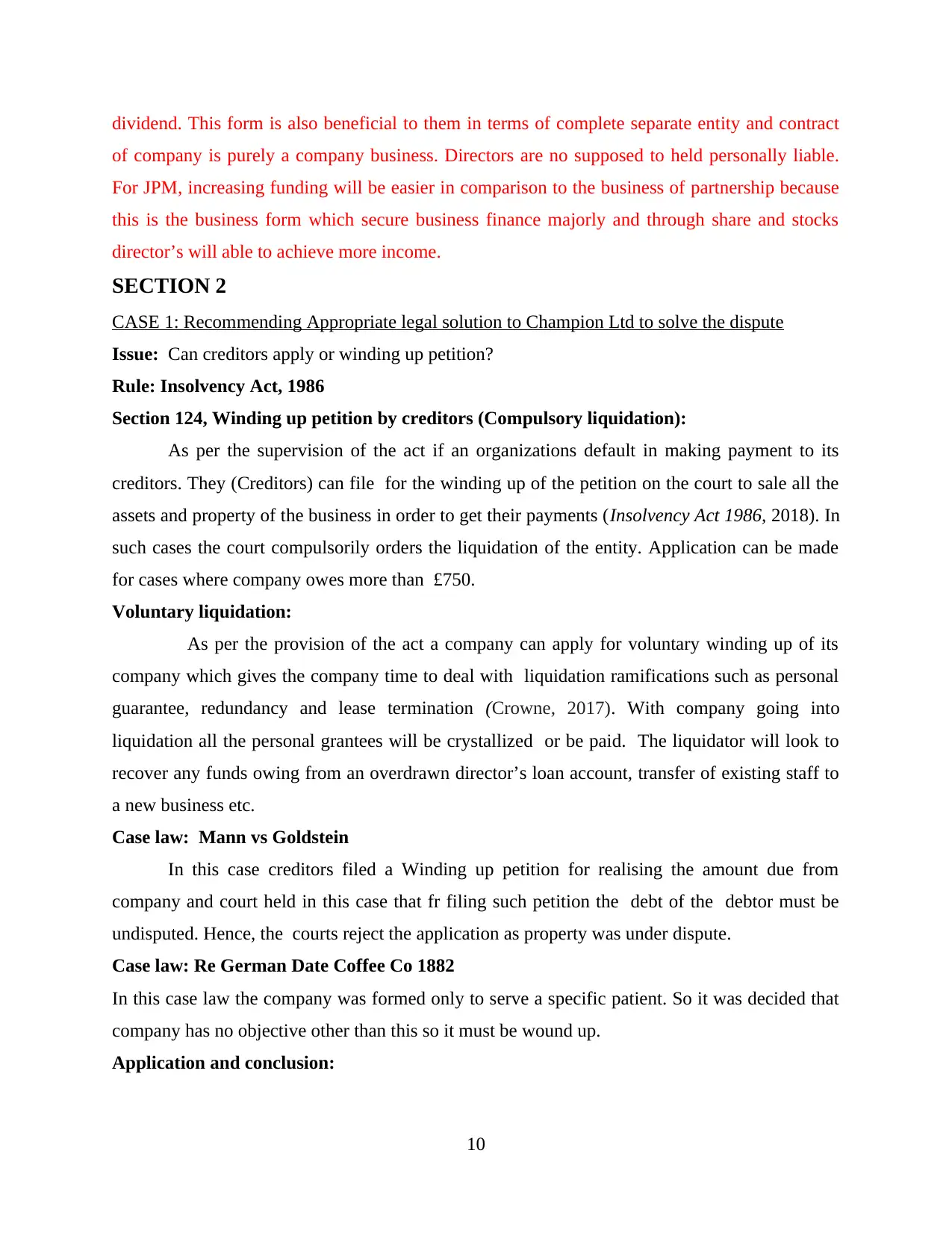
dividend. This form is also beneficial to them in terms of complete separate entity and contract
of company is purely a company business. Directors are no supposed to held personally liable.
For JPM, increasing funding will be easier in comparison to the business of partnership because
this is the business form which secure business finance majorly and through share and stocks
director’s will able to achieve more income.
SECTION 2
CASE 1: Recommending Appropriate legal solution to Champion Ltd to solve the dispute
Issue: Can creditors apply or winding up petition?
Rule: Insolvency Act, 1986
Section 124, Winding up petition by creditors (Compulsory liquidation):
As per the supervision of the act if an organizations default in making payment to its
creditors. They (Creditors) can file for the winding up of the petition on the court to sale all the
assets and property of the business in order to get their payments (Insolvency Act 1986, 2018). In
such cases the court compulsorily orders the liquidation of the entity. Application can be made
for cases where company owes more than £750.
Voluntary liquidation:
As per the provision of the act a company can apply for voluntary winding up of its
company which gives the company time to deal with liquidation ramifications such as personal
guarantee, redundancy and lease termination (Crowne, 2017). With company going into
liquidation all the personal grantees will be crystallized or be paid. The liquidator will look to
recover any funds owing from an overdrawn director’s loan account, transfer of existing staff to
a new business etc.
Case law: Mann vs Goldstein
In this case creditors filed a Winding up petition for realising the amount due from
company and court held in this case that fr filing such petition the debt of the debtor must be
undisputed. Hence, the courts reject the application as property was under dispute.
Case law: Re German Date Coffee Co 1882
In this case law the company was formed only to serve a specific patient. So it was decided that
company has no objective other than this so it must be wound up.
Application and conclusion:
10
of company is purely a company business. Directors are no supposed to held personally liable.
For JPM, increasing funding will be easier in comparison to the business of partnership because
this is the business form which secure business finance majorly and through share and stocks
director’s will able to achieve more income.
SECTION 2
CASE 1: Recommending Appropriate legal solution to Champion Ltd to solve the dispute
Issue: Can creditors apply or winding up petition?
Rule: Insolvency Act, 1986
Section 124, Winding up petition by creditors (Compulsory liquidation):
As per the supervision of the act if an organizations default in making payment to its
creditors. They (Creditors) can file for the winding up of the petition on the court to sale all the
assets and property of the business in order to get their payments (Insolvency Act 1986, 2018). In
such cases the court compulsorily orders the liquidation of the entity. Application can be made
for cases where company owes more than £750.
Voluntary liquidation:
As per the provision of the act a company can apply for voluntary winding up of its
company which gives the company time to deal with liquidation ramifications such as personal
guarantee, redundancy and lease termination (Crowne, 2017). With company going into
liquidation all the personal grantees will be crystallized or be paid. The liquidator will look to
recover any funds owing from an overdrawn director’s loan account, transfer of existing staff to
a new business etc.
Case law: Mann vs Goldstein
In this case creditors filed a Winding up petition for realising the amount due from
company and court held in this case that fr filing such petition the debt of the debtor must be
undisputed. Hence, the courts reject the application as property was under dispute.
Case law: Re German Date Coffee Co 1882
In this case law the company was formed only to serve a specific patient. So it was decided that
company has no objective other than this so it must be wound up.
Application and conclusion:
10
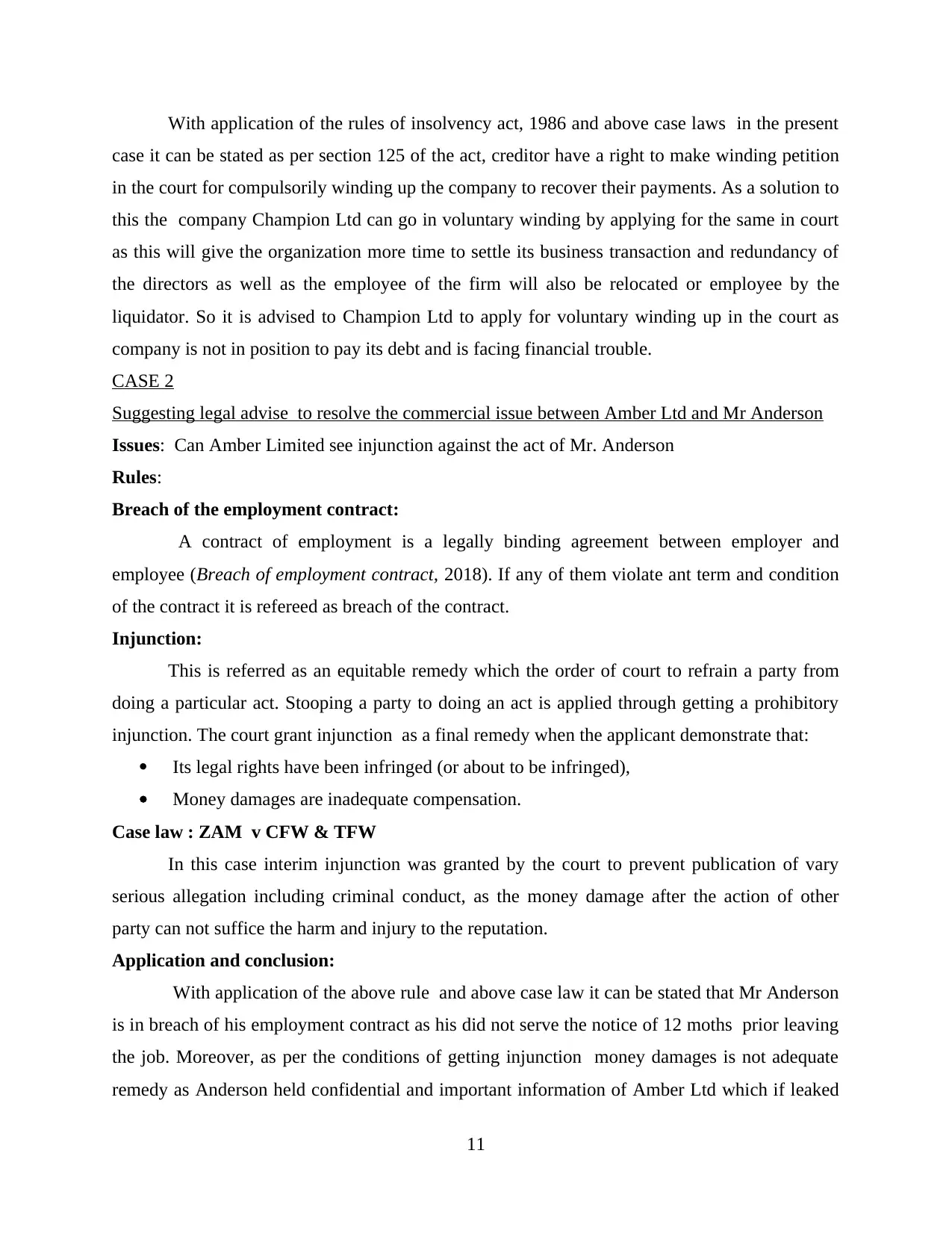
With application of the rules of insolvency act, 1986 and above case laws in the present
case it can be stated as per section 125 of the act, creditor have a right to make winding petition
in the court for compulsorily winding up the company to recover their payments. As a solution to
this the company Champion Ltd can go in voluntary winding by applying for the same in court
as this will give the organization more time to settle its business transaction and redundancy of
the directors as well as the employee of the firm will also be relocated or employee by the
liquidator. So it is advised to Champion Ltd to apply for voluntary winding up in the court as
company is not in position to pay its debt and is facing financial trouble.
CASE 2
Suggesting legal advise to resolve the commercial issue between Amber Ltd and Mr Anderson
Issues: Can Amber Limited see injunction against the act of Mr. Anderson
Rules:
Breach of the employment contract:
A contract of employment is a legally binding agreement between employer and
employee (Breach of employment contract, 2018). If any of them violate ant term and condition
of the contract it is refereed as breach of the contract.
Injunction:
This is referred as an equitable remedy which the order of court to refrain a party from
doing a particular act. Stooping a party to doing an act is applied through getting a prohibitory
injunction. The court grant injunction as a final remedy when the applicant demonstrate that:
Its legal rights have been infringed (or about to be infringed),
Money damages are inadequate compensation.
Case law : ZAM v CFW & TFW
In this case interim injunction was granted by the court to prevent publication of vary
serious allegation including criminal conduct, as the money damage after the action of other
party can not suffice the harm and injury to the reputation.
Application and conclusion:
With application of the above rule and above case law it can be stated that Mr Anderson
is in breach of his employment contract as his did not serve the notice of 12 moths prior leaving
the job. Moreover, as per the conditions of getting injunction money damages is not adequate
remedy as Anderson held confidential and important information of Amber Ltd which if leaked
11
case it can be stated as per section 125 of the act, creditor have a right to make winding petition
in the court for compulsorily winding up the company to recover their payments. As a solution to
this the company Champion Ltd can go in voluntary winding by applying for the same in court
as this will give the organization more time to settle its business transaction and redundancy of
the directors as well as the employee of the firm will also be relocated or employee by the
liquidator. So it is advised to Champion Ltd to apply for voluntary winding up in the court as
company is not in position to pay its debt and is facing financial trouble.
CASE 2
Suggesting legal advise to resolve the commercial issue between Amber Ltd and Mr Anderson
Issues: Can Amber Limited see injunction against the act of Mr. Anderson
Rules:
Breach of the employment contract:
A contract of employment is a legally binding agreement between employer and
employee (Breach of employment contract, 2018). If any of them violate ant term and condition
of the contract it is refereed as breach of the contract.
Injunction:
This is referred as an equitable remedy which the order of court to refrain a party from
doing a particular act. Stooping a party to doing an act is applied through getting a prohibitory
injunction. The court grant injunction as a final remedy when the applicant demonstrate that:
Its legal rights have been infringed (or about to be infringed),
Money damages are inadequate compensation.
Case law : ZAM v CFW & TFW
In this case interim injunction was granted by the court to prevent publication of vary
serious allegation including criminal conduct, as the money damage after the action of other
party can not suffice the harm and injury to the reputation.
Application and conclusion:
With application of the above rule and above case law it can be stated that Mr Anderson
is in breach of his employment contract as his did not serve the notice of 12 moths prior leaving
the job. Moreover, as per the conditions of getting injunction money damages is not adequate
remedy as Anderson held confidential and important information of Amber Ltd which if leaked
11
Paraphrase This Document
Need a fresh take? Get an instant paraphrase of this document with our AI Paraphraser
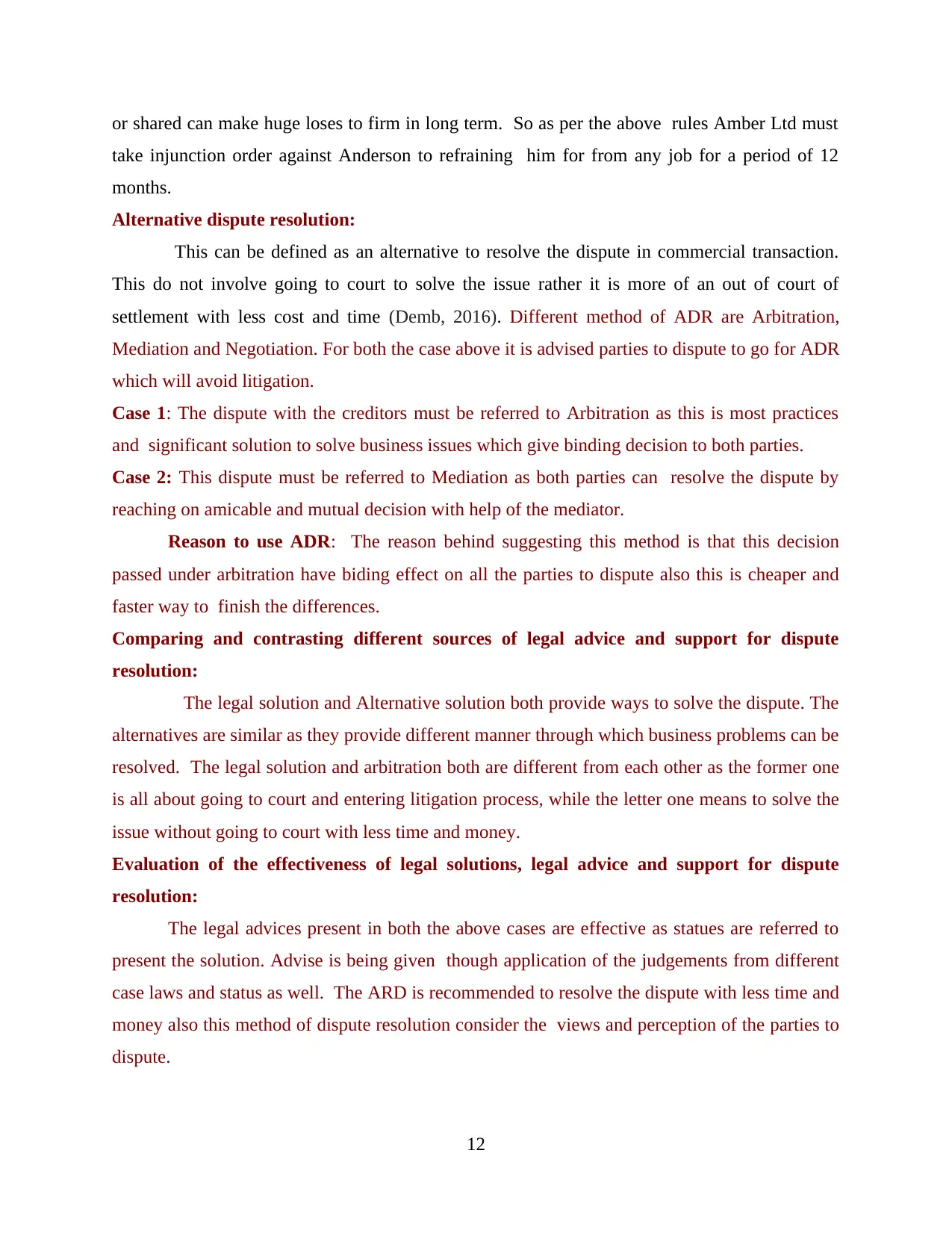
or shared can make huge loses to firm in long term. So as per the above rules Amber Ltd must
take injunction order against Anderson to refraining him for from any job for a period of 12
months.
Alternative dispute resolution:
This can be defined as an alternative to resolve the dispute in commercial transaction.
This do not involve going to court to solve the issue rather it is more of an out of court of
settlement with less cost and time (Demb, 2016). Different method of ADR are Arbitration,
Mediation and Negotiation. For both the case above it is advised parties to dispute to go for ADR
which will avoid litigation.
Case 1: The dispute with the creditors must be referred to Arbitration as this is most practices
and significant solution to solve business issues which give binding decision to both parties.
Case 2: This dispute must be referred to Mediation as both parties can resolve the dispute by
reaching on amicable and mutual decision with help of the mediator.
Reason to use ADR: The reason behind suggesting this method is that this decision
passed under arbitration have biding effect on all the parties to dispute also this is cheaper and
faster way to finish the differences.
Comparing and contrasting different sources of legal advice and support for dispute
resolution:
The legal solution and Alternative solution both provide ways to solve the dispute. The
alternatives are similar as they provide different manner through which business problems can be
resolved. The legal solution and arbitration both are different from each other as the former one
is all about going to court and entering litigation process, while the letter one means to solve the
issue without going to court with less time and money.
Evaluation of the effectiveness of legal solutions, legal advice and support for dispute
resolution:
The legal advices present in both the above cases are effective as statues are referred to
present the solution. Advise is being given though application of the judgements from different
case laws and status as well. The ARD is recommended to resolve the dispute with less time and
money also this method of dispute resolution consider the views and perception of the parties to
dispute.
12
take injunction order against Anderson to refraining him for from any job for a period of 12
months.
Alternative dispute resolution:
This can be defined as an alternative to resolve the dispute in commercial transaction.
This do not involve going to court to solve the issue rather it is more of an out of court of
settlement with less cost and time (Demb, 2016). Different method of ADR are Arbitration,
Mediation and Negotiation. For both the case above it is advised parties to dispute to go for ADR
which will avoid litigation.
Case 1: The dispute with the creditors must be referred to Arbitration as this is most practices
and significant solution to solve business issues which give binding decision to both parties.
Case 2: This dispute must be referred to Mediation as both parties can resolve the dispute by
reaching on amicable and mutual decision with help of the mediator.
Reason to use ADR: The reason behind suggesting this method is that this decision
passed under arbitration have biding effect on all the parties to dispute also this is cheaper and
faster way to finish the differences.
Comparing and contrasting different sources of legal advice and support for dispute
resolution:
The legal solution and Alternative solution both provide ways to solve the dispute. The
alternatives are similar as they provide different manner through which business problems can be
resolved. The legal solution and arbitration both are different from each other as the former one
is all about going to court and entering litigation process, while the letter one means to solve the
issue without going to court with less time and money.
Evaluation of the effectiveness of legal solutions, legal advice and support for dispute
resolution:
The legal advices present in both the above cases are effective as statues are referred to
present the solution. Advise is being given though application of the judgements from different
case laws and status as well. The ARD is recommended to resolve the dispute with less time and
money also this method of dispute resolution consider the views and perception of the parties to
dispute.
12
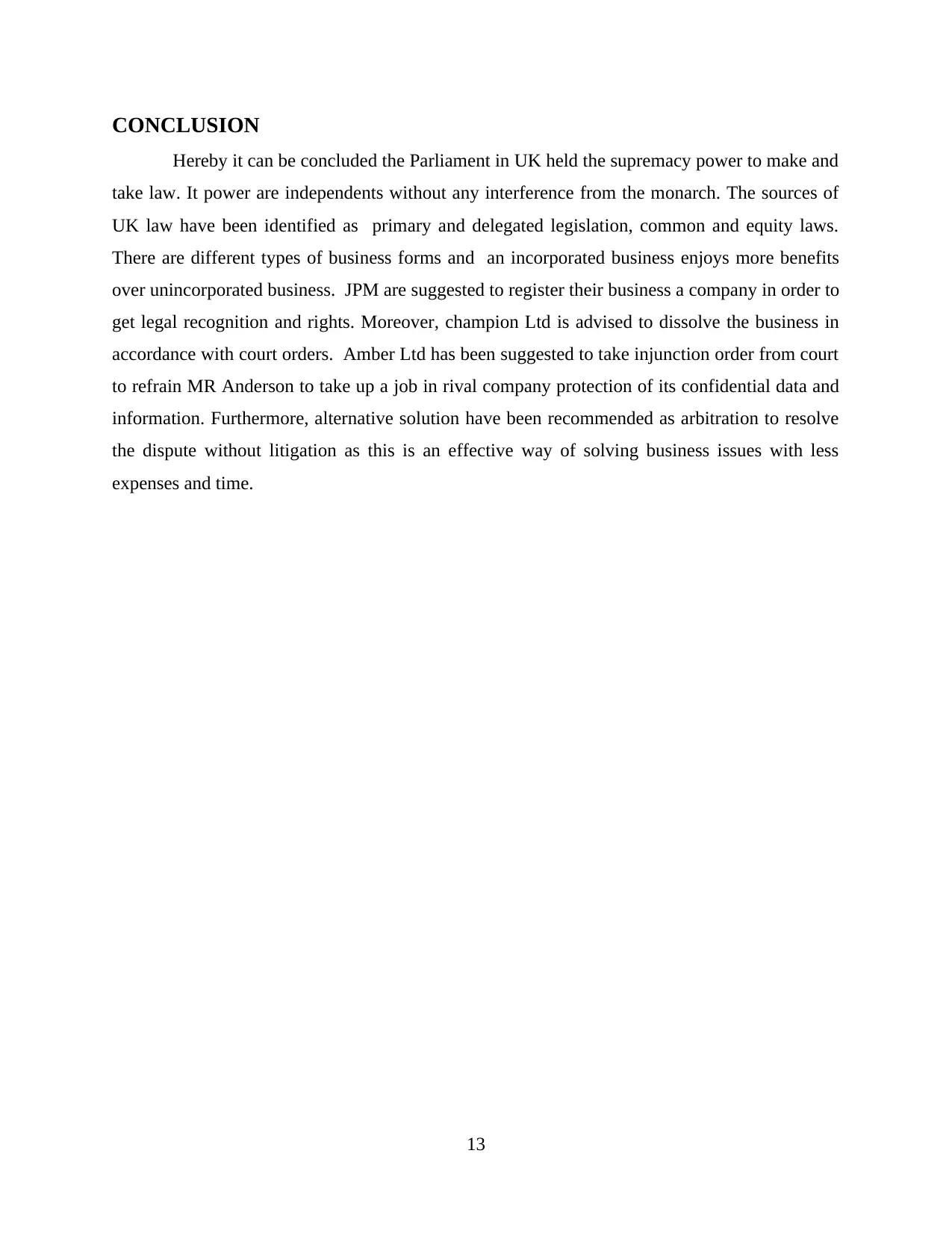
CONCLUSION
Hereby it can be concluded the Parliament in UK held the supremacy power to make and
take law. It power are independents without any interference from the monarch. The sources of
UK law have been identified as primary and delegated legislation, common and equity laws.
There are different types of business forms and an incorporated business enjoys more benefits
over unincorporated business. JPM are suggested to register their business a company in order to
get legal recognition and rights. Moreover, champion Ltd is advised to dissolve the business in
accordance with court orders. Amber Ltd has been suggested to take injunction order from court
to refrain MR Anderson to take up a job in rival company protection of its confidential data and
information. Furthermore, alternative solution have been recommended as arbitration to resolve
the dispute without litigation as this is an effective way of solving business issues with less
expenses and time.
13
Hereby it can be concluded the Parliament in UK held the supremacy power to make and
take law. It power are independents without any interference from the monarch. The sources of
UK law have been identified as primary and delegated legislation, common and equity laws.
There are different types of business forms and an incorporated business enjoys more benefits
over unincorporated business. JPM are suggested to register their business a company in order to
get legal recognition and rights. Moreover, champion Ltd is advised to dissolve the business in
accordance with court orders. Amber Ltd has been suggested to take injunction order from court
to refrain MR Anderson to take up a job in rival company protection of its confidential data and
information. Furthermore, alternative solution have been recommended as arbitration to resolve
the dispute without litigation as this is an effective way of solving business issues with less
expenses and time.
13
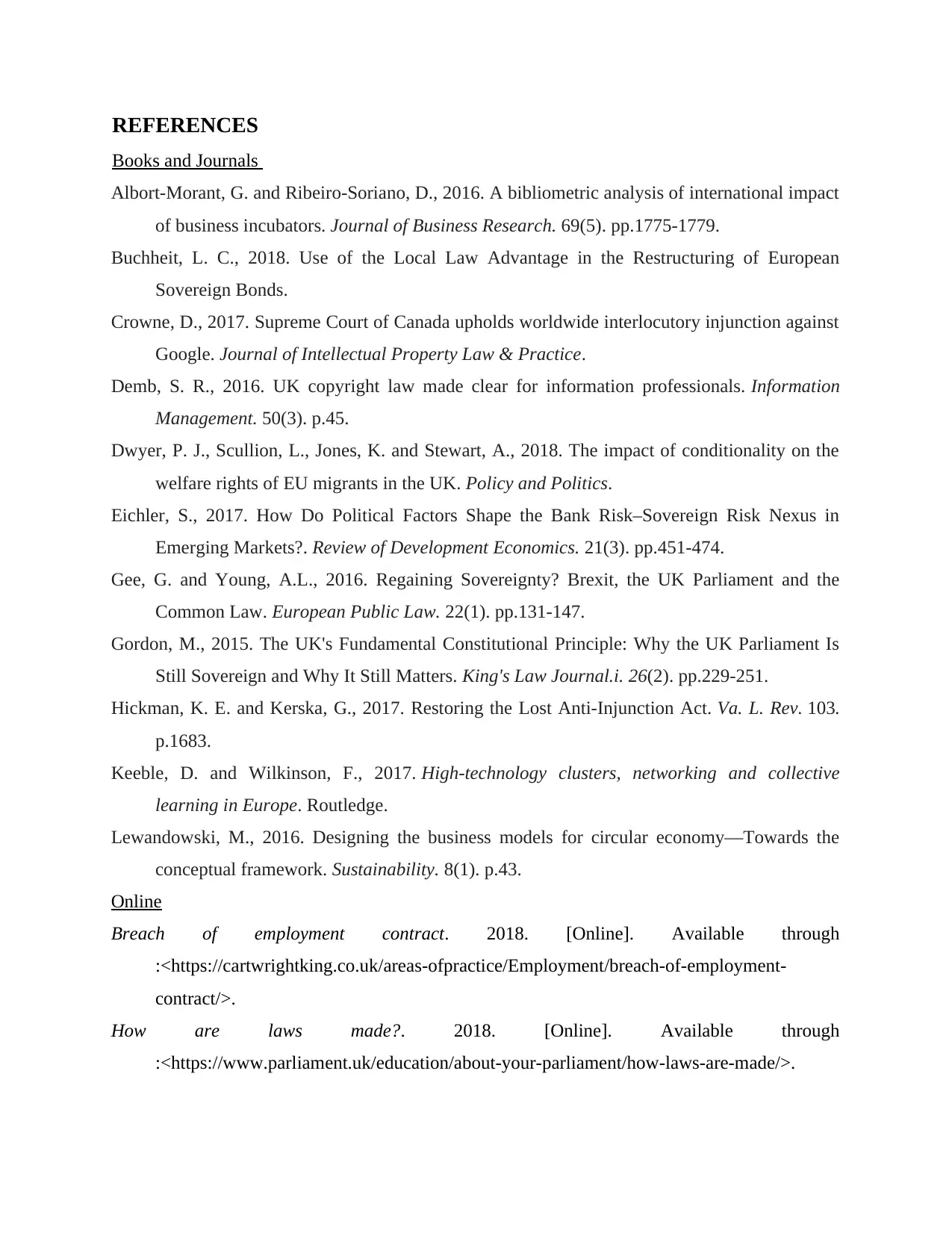
REFERENCES
Books and Journals
Albort-Morant, G. and Ribeiro-Soriano, D., 2016. A bibliometric analysis of international impact
of business incubators. Journal of Business Research. 69(5). pp.1775-1779.
Buchheit, L. C., 2018. Use of the Local Law Advantage in the Restructuring of European
Sovereign Bonds.
Crowne, D., 2017. Supreme Court of Canada upholds worldwide interlocutory injunction against
Google. Journal of Intellectual Property Law & Practice.
Demb, S. R., 2016. UK copyright law made clear for information professionals. Information
Management. 50(3). p.45.
Dwyer, P. J., Scullion, L., Jones, K. and Stewart, A., 2018. The impact of conditionality on the
welfare rights of EU migrants in the UK. Policy and Politics.
Eichler, S., 2017. How Do Political Factors Shape the Bank Risk–Sovereign Risk Nexus in
Emerging Markets?. Review of Development Economics. 21(3). pp.451-474.
Gee, G. and Young, A.L., 2016. Regaining Sovereignty? Brexit, the UK Parliament and the
Common Law. European Public Law. 22(1). pp.131-147.
Gordon, M., 2015. The UK's Fundamental Constitutional Principle: Why the UK Parliament Is
Still Sovereign and Why It Still Matters. King's Law Journal.i. 26(2). pp.229-251.
Hickman, K. E. and Kerska, G., 2017. Restoring the Lost Anti-Injunction Act. Va. L. Rev. 103.
p.1683.
Keeble, D. and Wilkinson, F., 2017. High-technology clusters, networking and collective
learning in Europe. Routledge.
Lewandowski, M., 2016. Designing the business models for circular economy—Towards the
conceptual framework. Sustainability. 8(1). p.43.
Online
Breach of employment contract. 2018. [Online]. Available through
:<https://cartwrightking.co.uk/areas-ofpractice/Employment/breach-of-employment-
contract/>.
How are laws made?. 2018. [Online]. Available through
:<https://www.parliament.uk/education/about-your-parliament/how-laws-are-made/>.
Books and Journals
Albort-Morant, G. and Ribeiro-Soriano, D., 2016. A bibliometric analysis of international impact
of business incubators. Journal of Business Research. 69(5). pp.1775-1779.
Buchheit, L. C., 2018. Use of the Local Law Advantage in the Restructuring of European
Sovereign Bonds.
Crowne, D., 2017. Supreme Court of Canada upholds worldwide interlocutory injunction against
Google. Journal of Intellectual Property Law & Practice.
Demb, S. R., 2016. UK copyright law made clear for information professionals. Information
Management. 50(3). p.45.
Dwyer, P. J., Scullion, L., Jones, K. and Stewart, A., 2018. The impact of conditionality on the
welfare rights of EU migrants in the UK. Policy and Politics.
Eichler, S., 2017. How Do Political Factors Shape the Bank Risk–Sovereign Risk Nexus in
Emerging Markets?. Review of Development Economics. 21(3). pp.451-474.
Gee, G. and Young, A.L., 2016. Regaining Sovereignty? Brexit, the UK Parliament and the
Common Law. European Public Law. 22(1). pp.131-147.
Gordon, M., 2015. The UK's Fundamental Constitutional Principle: Why the UK Parliament Is
Still Sovereign and Why It Still Matters. King's Law Journal.i. 26(2). pp.229-251.
Hickman, K. E. and Kerska, G., 2017. Restoring the Lost Anti-Injunction Act. Va. L. Rev. 103.
p.1683.
Keeble, D. and Wilkinson, F., 2017. High-technology clusters, networking and collective
learning in Europe. Routledge.
Lewandowski, M., 2016. Designing the business models for circular economy—Towards the
conceptual framework. Sustainability. 8(1). p.43.
Online
Breach of employment contract. 2018. [Online]. Available through
:<https://cartwrightking.co.uk/areas-ofpractice/Employment/breach-of-employment-
contract/>.
How are laws made?. 2018. [Online]. Available through
:<https://www.parliament.uk/education/about-your-parliament/how-laws-are-made/>.
Secure Best Marks with AI Grader
Need help grading? Try our AI Grader for instant feedback on your assignments.

Insolvency Act 1986. 2018. [Online]. Available through
:<https://www.legislation.gov.uk/ukpga/1986/45/section/124>.
2
:<https://www.legislation.gov.uk/ukpga/1986/45/section/124>.
2
1 out of 17
Related Documents
Your All-in-One AI-Powered Toolkit for Academic Success.
+13062052269
info@desklib.com
Available 24*7 on WhatsApp / Email
![[object Object]](/_next/static/media/star-bottom.7253800d.svg)
Unlock your academic potential
© 2024 | Zucol Services PVT LTD | All rights reserved.





